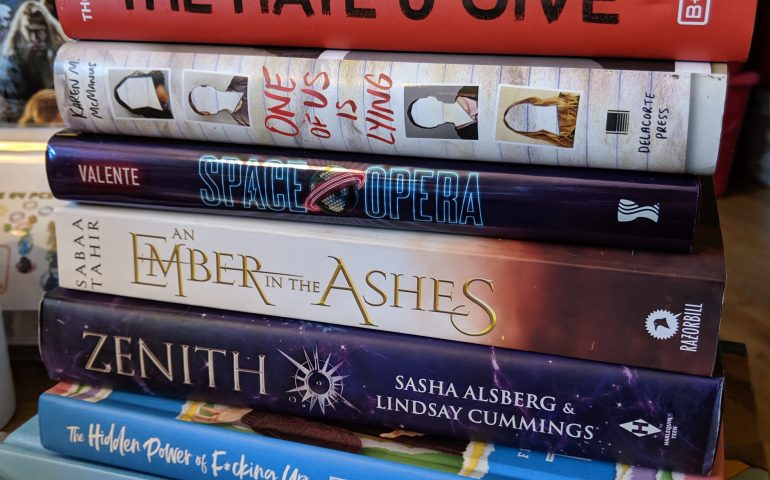Welcome to 2020! Below I’ll be keeping track of all the books I read this year and leaving short reviews about each. My goal this year is 12 books (one a month – I have a busy life, give me a break! Haha) and at least TWO writing craft books. Let’s see how we do!
Fiction
>> Save the Cat! Writes A Novel by Jessica Brody
This is my final read of 2020!
If you’re writing a novel, you need this book. Highest possible recommendation here!
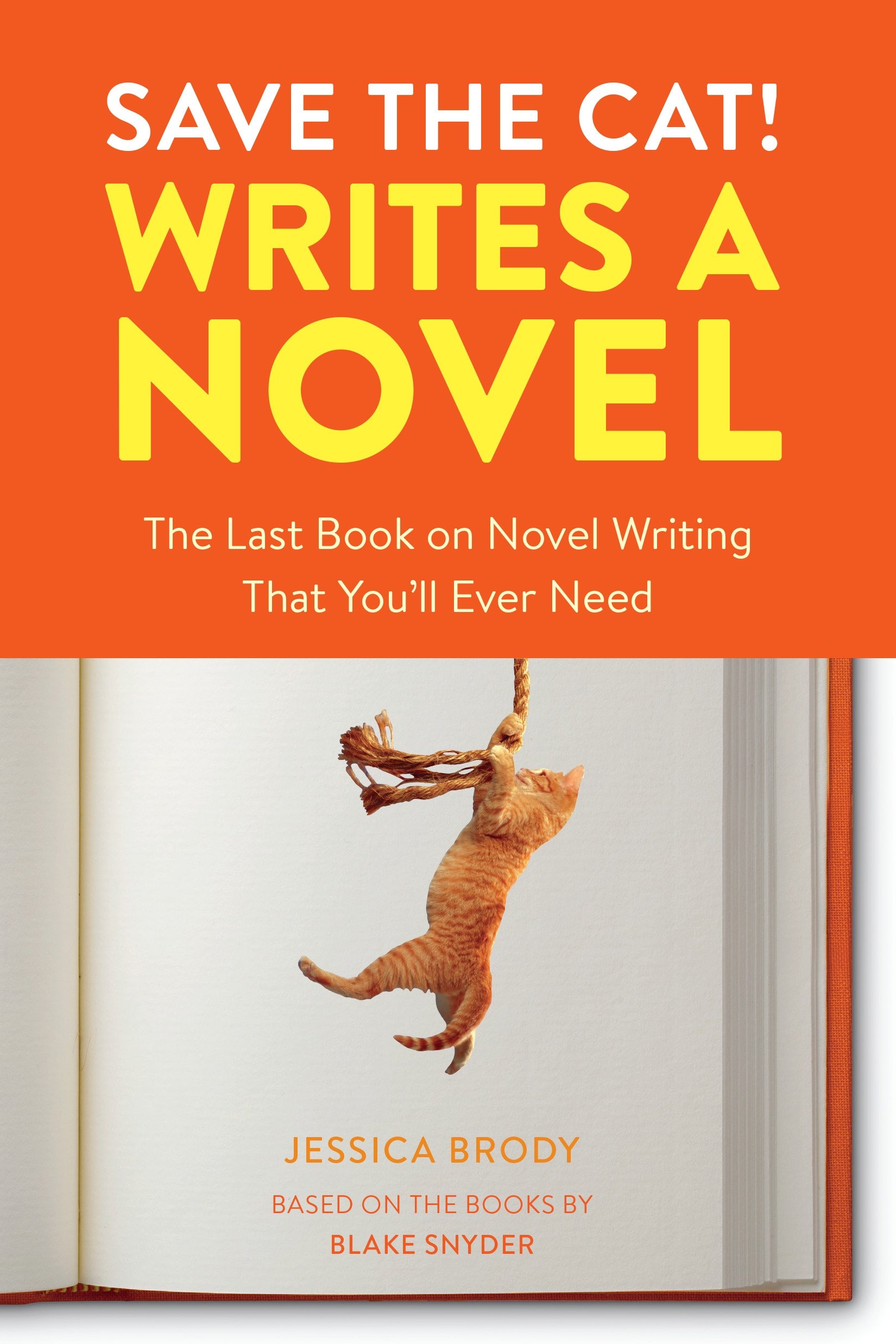
This writing craft beauty talks about the ten genres that every book (every story, really) fits into: Dude with a Problem, Institutionalized, Superhero, Buddy Love, etc. Jessica Brody goes over each genre and helps you peg the genre for your novel. Once you know your genre, you can study what elements you might be missing to help make the idea stronger. Additionally, and probably the biggest reason you should read this book, is for the Beat Sheet. A lot of authors have a semblance of Beat Sheet they go by, I’ve read plenty of them, but this one is thoroughly broken down and explained beautifully. She has a quick reference of the beats (everything that happens in Act 1 (Opening Scene, Theme Stated, Setup, etc), Act 2, and Act 3). Then goes in depth into every single beat and what they consist of. This helps you, the writer, figure out what’s missing from your novel or helps you structure your next one (however you choose to use the book).
>> A Ballad of Songbirds and Snakes by Suzanne Collins
This book is about Coriolanus Snow, future president to the Capitol. I don’t think anyone asked for this dude’s backstory, but I was so excited to be back in the world of Hunger Games it didn’t matter. In this, Snow becomes a mentor in the first-ever group of mentors to a tribute in the Games, Lucy Gray, who of course he falls for.
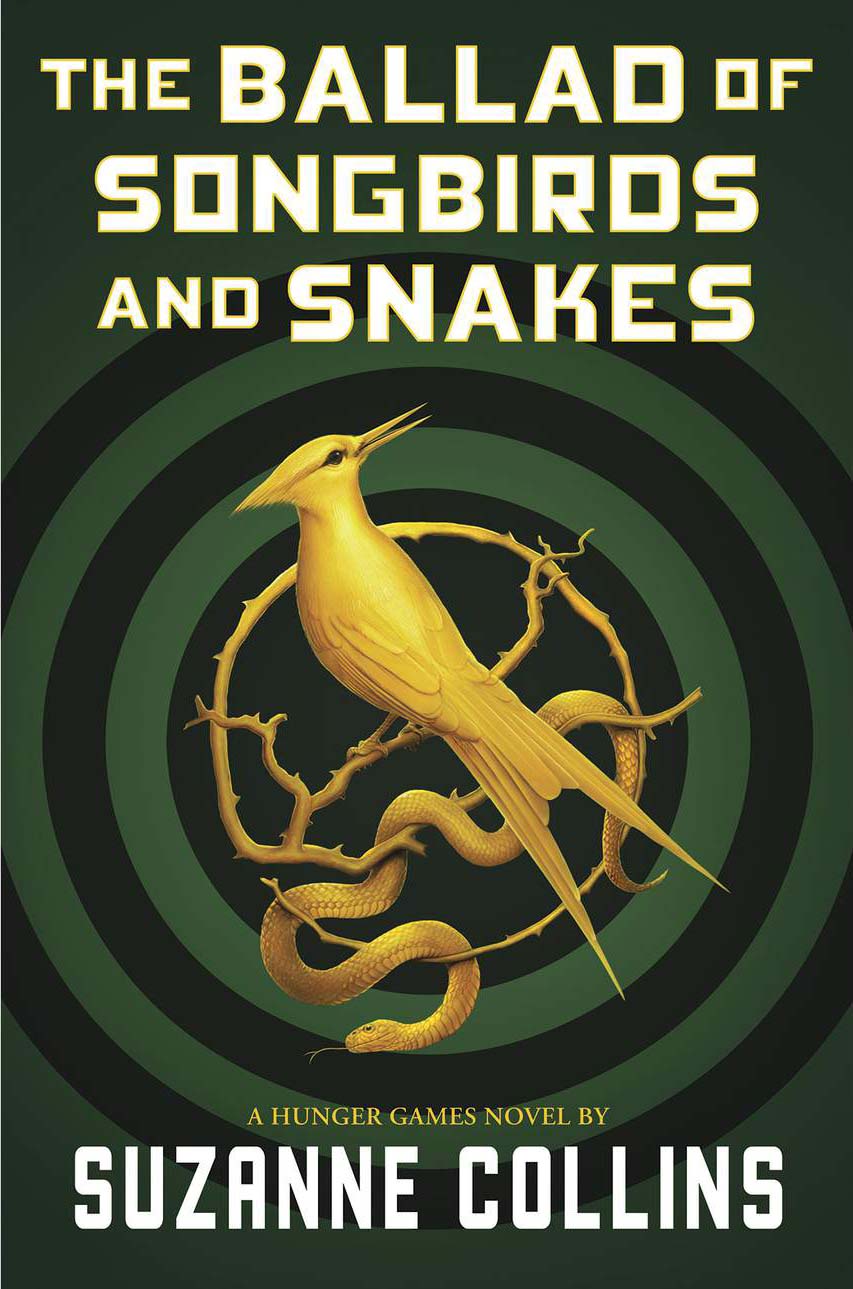
I did not like this book. Let’s start with Coriolanus himself, as we follow him through the story. This is about a kid who is used to having money, but lost his parents and a lot of that wealth in the war. Despite the horrors he’d been through, he’s still a snotty, privileged white kid trying to maintain his posh looks so no one finds out he’s broke like the rest of them. I found him to be mean and off-putting. I get it, he grows into an evil dude and there were moments where his sharp mind and evil ways poked their head in and I loved them, but mostly his personality was him either being high-brow or completely naïve (which didn’t read well). It wasn’t an evil character that you wanted to follow for a whole story, and there wasn’t much in the way as sympathy either. So it didn’t push into the “enemy but we care now” territory nor was he so sharp witted and evil that we hated that we loved him. And I think that’s what she was going for, showing his growth into his vile self, but it did not work for me.
The book doesn’t even feel like Suzanne Collins’ writing. I read Hunger Games and two of the Underlander series, and this is… different. It feels overwritten, or perhaps heavily underedited. There were multiple times that I felt like this was written by a ghost writer of a different skill level. In fact, the entire book was written in Telling not Showing. She just told you what happened every step of the way (with a few interior thoughts thrown in and barely any dialogue), instead of you being a part of the character. I get that the title says “Ballad” and maybe should feel lengthy, but I don’t think this was executed well. I found the Hunger Games themselves to be boring and the third act came out of fucking nowhere. It honestly felt like she took the backstory she wrote for President Snow, bolstered it up into a full novel, and published it. I expected so much more.
>> Labyrinth Lost by Zoraida Cordova
You made a snake come out of a boy’s throat for me. I’m not going to leave you in some Neverland dimension with a guy you don’t even know.
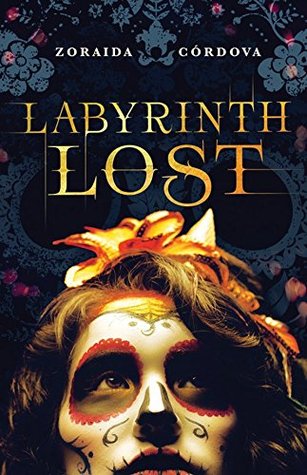
Truly, the book just felt okay to me, which was a surprise. I loved the cultural influences, the magic and monsters and portals into the realm of Los Lagos, a land treated as a true tall tale with bits gathered from family over time. It actually felt like I was reading a folk tale, which was kind of neat.
However, a lot of the book felt simply plotted and predictable. The scenes felt a bit episodic or staccato in the sense that one thing would happen then there would be a loose transition into the next thing and so on. (Although I’ll admit that I’m beginning to grow weary of books with maps in the opening as they often feel this way.) They picked a path on the map and moved forward through each pitstop, nothing ever completely altering their way. I found a lot of pages full of Telling so I never felt fully invested in the scenes or character’s headspace. I liked the main trio of characters and their banter, but I wanted more from them. I suppose I wanted more from the whole book.
I absolutely adore Zoraida Cordova and I do plan on reading more of her work. I think this book just wasn’t for me.
>> Mexican Gothic by Silvia Moreno-Garcia
Spooky, creepy, gruesome. A constant “get out while you can” feeling creeping up your spine even when you couldn’t place why.
Sidebar, did anyone else imagine Tahani from The Good Place while reading this??
I’ll be honest, I didn’t love the author’s writing at the beginning. It felt a bit… overwritten? Every moment was almost too detailed, I think to help set the setting and mood, but it felt like a lot. So I had to splash around in the tides to get my feet wet for a couple chapters before I dove in (and didn’t look back!) Once I hit Chapter 3, I didn’t want to stop reading. It was full of atmospheric, spooky elements like the old, decrepit house, occupants keeping devilish secrets, and strange enticing nightmares every night. I didn’t feel like the character’s motivation was strong enough at the beginning, but once she’s in the house, dealing with the effects and situations, the motivation didn’t quite matter anymore. ALSO you can really tell this author spent a lot of time on her chapter work, because each chapter was beautifully organized with a lovely scene arc.
Just to add, I was trying to finish a different book while reading this one’s opening so I didn’t allow myself to become fully invested. But once this book was my sole focus, I read it in five days!
It was a great fall read!
>> The Ten Thousand Doors of January by Alix E. Harrow
A gorgeous book filled with magic, hope, and freedom. This book wasn’t quite what I expected but I loved it all the same.
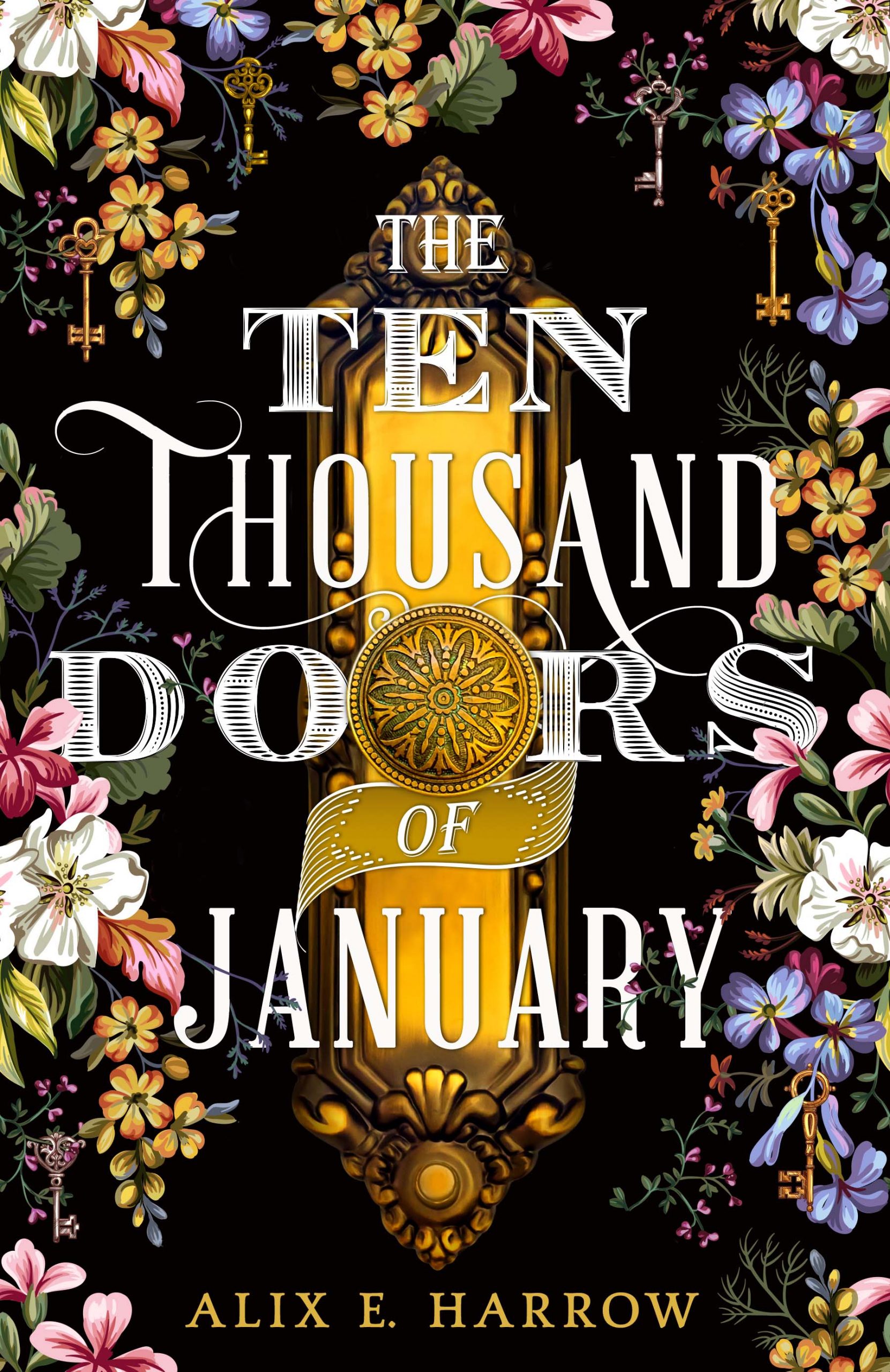
It followed two parallel stories, one of an in-between girl that never quite felt she belonged and was trapped under her caregiver’s strict rules to become a model citizen, a Good Girl, while wanting to be off adventuring with her father (who worked for the caregiver). The other, a character from a story, a rambunctious girl who found a boy that came through a doorway in the middle of a wheat field, and, after the doorway was destroyed, spent years searching for him and his world. The two characters tie in together in the end, and the story of the wheat-field-couple becomes more real every chapter. Our in-between girl learns what monsters can come through the open doorways and will have to decide if they should stay open, while discovering a magic ability she’s possessed all along.
>> Children of Blood and Bone by Tomi Adeyemi
This review has some spoilers.
Overall, I did enjoy this read and I would recommend it. I loved the worldbuilding, being submerged into this west-African inspired culture made me really felt like I was in Orisha. I truly appreciated the beauty poured into the sacred gods and goddesses. And I loved the book’s powerful message about the fight against institutional racism and oppression, racial tension and prejudice in a society.
The characters were decently well rounded, and of course I loved seeing the diversity – an all black cast in a YA epic fantasy is amaaaaazing. I particularly LOVED roguish Roen and protective big bro Tzain. I really enjoyed the quiet character moments where they joked and laughed, those felt fully realized. I wish there were more, but loved what was there.
The adventure was solid, but a bit formulaic. I could tell Adeyemi worked off an outline of some sort, it felt systematic like “okay now the Chandomble scenes happen, now they’re in the desert, now the sea caves” with very little transition on their massive trek through the lands.
(There are spoilers in all the below paragraphs, except the last one.)

I wanted to talk about the romance between Zelie and Inan for a second. It was really rushed. They wanted to rule the world together after mere hours. Although I get it, he was able to see inside her head and he felt ALL the things for her all at once, but still. The love they felt was severely undermined, but I wont say how. I kept thinking there was a twist coming in his character. I thought maybe Inan was trying to trick her into having feelings for him so he could learn where the artifacts were. Or that, in the end, he would still choose her and turn on his father. But he did neither. They played it out like he loved her with his entire being and he still chose his father’s side.
Inan had this “duty before self” mantra that his father, the king, drilled into him. The idea was that he needed to put the kingdom before any personal choices (like romancing Zelie). But there was a point that he realized “duty before self” could be taken a different way (that he had a duty to the people – including the oppressed maji, and he needed to care for them before himself). But then a couple chapters later had basically forgotten this realization??? I liked that it was so hard for him to give up his father’s beliefs and he believed he could make a better kingdom even without bringing magic back, but to completely trash this really cool realization and continue on his path was frustrating.
The characters spend a lot of time thinking they’ve been chosen by the gods for specific reasons, in fact Inan was “infected” with magic and felt like they chose him because of that. (This happen near the beginning not too spoilery). But when the time came to use his power, he chose to save his ruthless father instead, sealing his own demise. I thought the story was going somewhere else with it and I’m really disappointed with his final role. He didn’t do anything special with his powers. I thought he’d use the magic against his father and the block on Zelie’s magic would lift (which I guess might belittle the trauma, but it felt set up for that!) He didn’t seem to be chosen by the gods at all. His final moves didn’t change his sister’s mind and make her kill her father, she would have done that anyway. In the end, I had trouble seeing why the gods chose him. In fact, I’m not sure why the gods chose any of these characters to deliver the magical artifacts and bring magic back to their people. Zelie complained the whole time that she wasn’t the right person for this. I know she could fight and was clearly stubborn enough to complete this mission, but she didn’t have anything particularly special that made me realize “oh that’s why they chose her”.
Inan was perfectly set up to have a particular type of arc (redemption arc) and blatantly refused the calling, but then I didn’t feel like he fulfilled his potential at the end either.
Also Nailah??? What happened to her?? She just disappeared from the story. I was left to assume they left her on some landlocked area with someone to care for her. Seriously missed opportunity to have an emotional goodbye with Zelie, full of hope they’ll see each other again and a promise they’ll be back.
In the end, I liked the story. It felt like a good read for teens getting into Fantasy that haven’t read a thousand books and realized how formulaic this is. I loved the world and messages and PLEASE MORE DIVSERITY, but there were certain things that definitely bothered me the entire time.
>> The 7 1/2 Deaths of Evelyn Hardcastle
Groundhogs day meets murder mystery party! Evelyn Hardcastle will die every day. Aiden Bishop has 8 days to solve the murder, but every day he wakes up in the body of a different guest. There are other guests racing him to the solution, and some that are trying to help, but who can he trust?
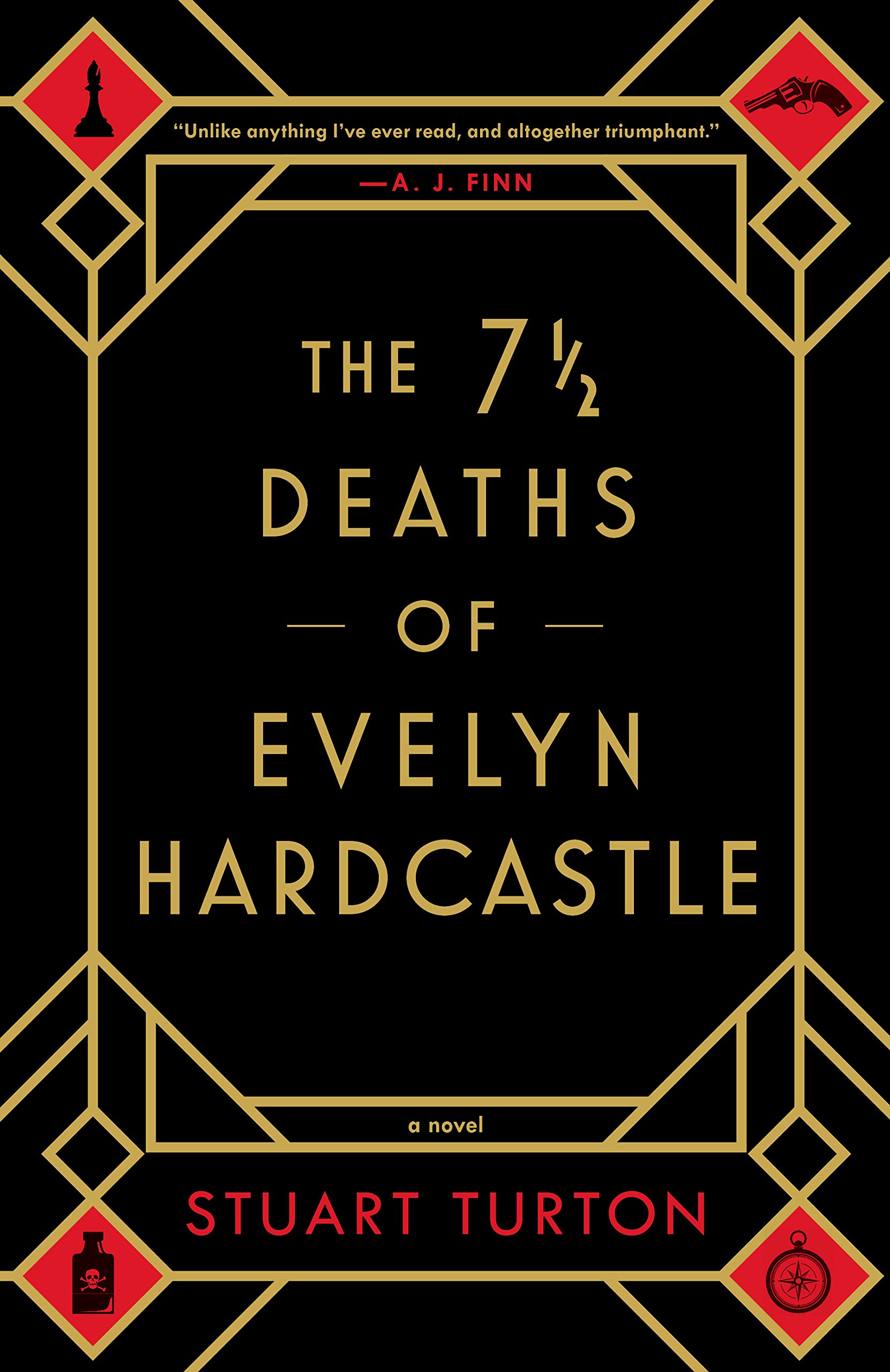
This was a great book, I don’t often read mystery, so I can’t compare it to many others, but I really enjoyed this. I was immediately hooked because the opening was in search of someone that wasn’t Evelyn, and the first witnessed murder isn’t a name included on the “Guest List” so I was already intrigued! I don’t usually like the amnesia tropes, but this was really well-handled. It’s a necessity for the story instead of convenient plot device.
And it’s not just one murder, there are a LOT of murders in this book! Plus murders from the past that end up connecting. All the pieces and clues were masterfully handled and came back into play in the end – I can’t even imagine what editing this monster was like!
My favorite thing Turton did was how Aiden struggles to handle the personalities that still reside inside his hosts. Headstrong guests that like things their own way battle against Aiden’s wishes, and as more days pass it gets harder to control them. I loved how Turton considered how the minds of different types of people worked, how they saw the world, and incorporated it into the hosts. Deftly handled.
>> The Library at Mount Char by Scott Hawkins
Conceptually, I loved this. All the ideas, from the individual scenes to the grand idea in the end, were fantastic. I loved the crazy randomness of it. The fact that the kids, tucked away from the world for years and used to going around in robes or nude, would dress however they wanted when they left their home (which meant you had a buff guy in a tutu and a girl in a Christmas sweater and bike shorts). I loved the wild amounts of gore that David brought. I ADORED Steve and his hilarious wit, especially when he had conversations with Carolyn or the lions (yep, lions).
I’m going to put a TW at the end of this review too, so if you feel like you might need that, it’s there for you.

I’ve heard a lot of people complain that the author throws you into the book and you’re sort of left to fend for yourself, figuring out what the heck is going on. A lot of people mention wanting to DNF until the halfway point. Perhaps, I was one of them – although Steve kept me reading. Lol. But I want to logic my way through why I felt that. For me, there were three things.
- So many of my questions got answered too quickly. That seems backward considering people felt like they were floundering for a grasp, but those are two different things. Building the world so your readers understand how it works is different from leaving breadcrumbs of interest. Although I didn’t know everything, and certainly didn’t know why characters were doing certain things, everything on the back flap copy was painted out very early in the book. 50 pages in, Steve and Carolyn have finished their strange heist and the readers are tossed into a scene about deer. With the questions that rose from the flap all tidied up plot-wise, I needed to find a reason to keep reading – and fast. But I struggled instead. I didn’t understand what Carolyn wanted yet, so it was hard to care.
- The beginning had repetitive details. It would say things like “Margaret stinks” every two pages, even vague things like moments surrounding David – but the vagueness itself was repeated! I just wanted something more solid to build those characters instead of it hitting me in the head with one random fact. Maybe it wasn’t the repetition that bothered me, but the lack of concrete details building out the world and characters (or rather, the details that were there felt random and I was looking for something important to cling to).
- This one might be a more personal part of my review, but I felt like the introduction of new characters were met with heavy stereotyping (like Erwin and the rap star). Erwin alone felt like such a stereotype of a veteran that it actually felt unresearched to me (and my husband, a veteran who had quite a bit to say lol). Erwin’s made out to be very special, nay famous, for his accomplishments, but otherwise everything he went through felt like “this is what happens to veterans, right?” Veterans are all so different and the things that make Erwin special were highlighted through the rest of the book so I guess I didn’t think it needed the other parts as much. I think I’m likely wrong about it being unresearched, because the acknowledgments section thanks a veteran for reading, but it felt like a choice that could have been more unique considering how creative other aspects of the work are.
A couple other things I didn’t love?
I’m also torn about the lion only having one POV chapter?? I liked the idea of being inside this character’s head for a bit, it really helped humanize them, but a nice rounding rule of thirds on this POV might have been nice. Or some other random POVs sprinkled in? Something so the one chapter didn’t feel so… alone?
This book also has a pretty graphic scene where one of the main characters is shooting sentries that are attacking him. But the sentries are dogs. Like normal dogs. The author spends a lot of time describing what kinds of dogs there are before shooting them in the head. Even though I know they’re viciously attacking him and I understand why the sentries are camouflaged as dogs (to fit in to the neighborhood), it STILL didn’t feel right to tell me what kind of purebred dog it was before you killed it. I know this is a personal thing, and I’m not completely turned off or anything (pls hand me all the gore), but it still was like… why? Why do you have to describe them as purebreds before gruesomely murdering them? Why not make them mutts to create a separation from creatures that most of your readers love? It was a weird choice.
The climax was great. I think everything boiled up to a breaking point and was painted out well. I loved this idea that the main character was taking vengeance on someone who seriously wronged her, and was fully ready to let the world burn because of what happened. And I absolutely loved everything after the climax, everything in the library and all the ideas that come forth once we’re in Carolyn’s world.
However, there was SO much character development and arc after the climax that it felt like there were two separate storylines. It was solidly “everything that happened” and “why”. I would have liked to see more of that development (that “why”) woven in through the book, because the main arc had Carolyn not feeling quite fleshed out (likely because we never grasped her goal/motivation till the end). A lot of the quirks she had throughout were written off in the end as false (I won’t say how exactly), but it meant that by the climax I didn’t feel like I knew the character at all. We only got to know her after the climax in that “why” arc. I would have liked some overlap in those two areas. I do understand why the backstory was saved until the end, though, even on the goodreads description it talks about how the main character has lost herself along the way, so I get needing a boost to help remember something and waiting until the end to show that particular scene to the reader. But it would have been nice to see her actually losing herself during the main plot.
In the end, I’m happy I read it. Like I said, conceptually loved it. I wished the arc was smoother and some details needed to be handled better.
TW: scenes and feelings stemming from a violent rape and murder (although I do believe this was handled gently), highly detailed gore scenes, and killing dogs (lots of them… they’re not really dogs and they’re viciously attacking so it’s self-defense, but they’re still painted out to be dogs – specific breeds too).
>> This is How You Lose the Time War by Amal El-Mohtar and Max Gladstone
“Not every battle’s grand, not every weapon fierce. Even we who fight wars through time forget the value of a word in the right moment, a rattle in the right car engine, a nail in the right horseshoe… It’s so easy to crush a planet that you may overlook the value of a whisper to a snowbank.”
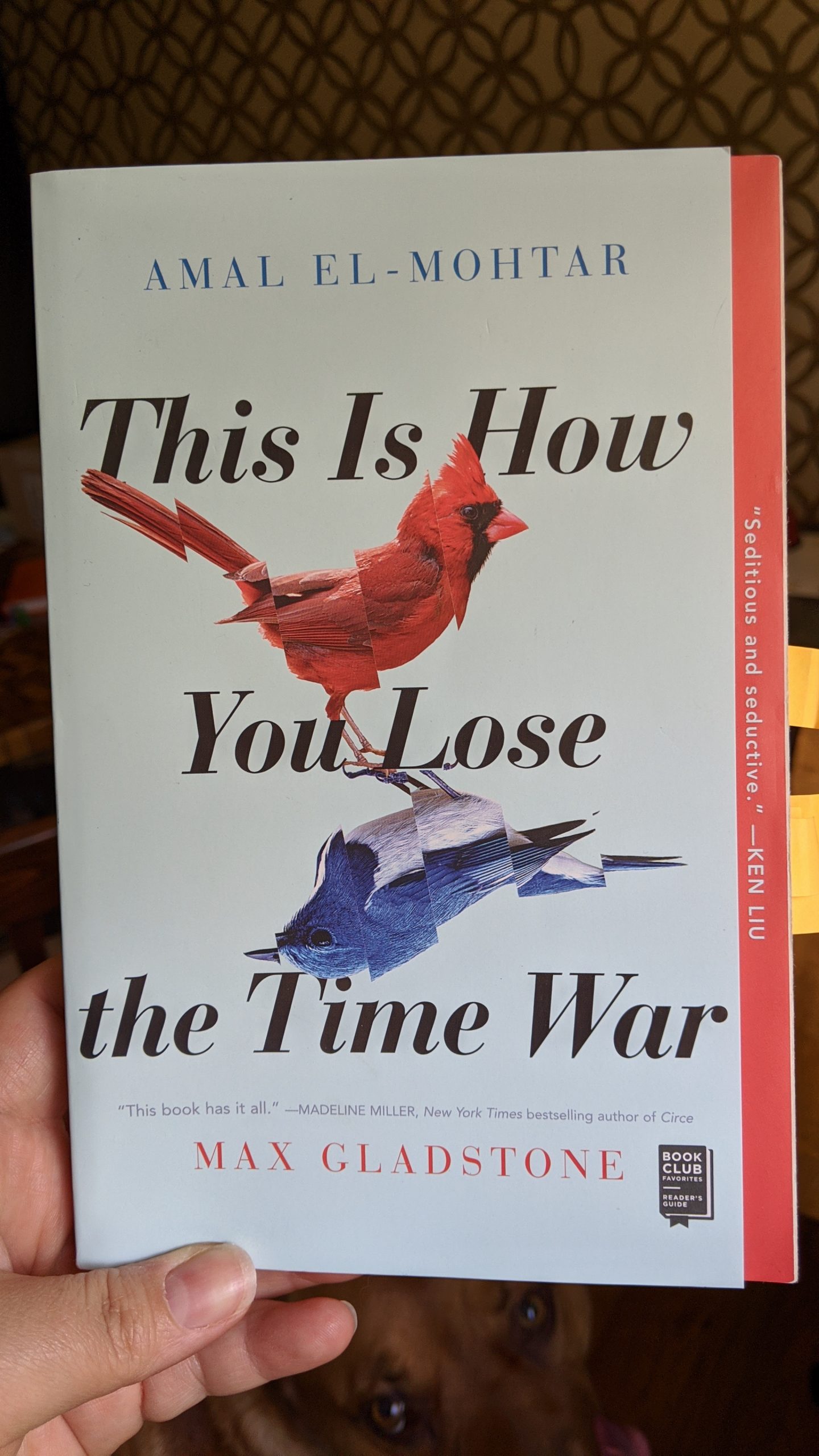
The correspondence was gorgeous. The two main characters, Red and Blue, are opposing agents in a time war – the best of their kind – and have begun writing letters for each other to find during their travels, letters so secret and embedded into the world that their superiors could never find them. Letters that are hidden in hot embers of lava, swirls of steaming tea, and age lines of tree trunks.
Their only mission is to win the war, but as the book goes on, their idea of what winning means changes. Their recognition of who they are to each other shifts. The story is remarkably beautiful, poignant, and romantic with “star-crossed lovers” vibes.
The language in this book almost feels ethereal. There’s something poetic about it and it often flaunts with being perfectly tied down. Most of the feelings, and on occasion, some details were fully realized, but any time the characters visited a place, the details were lofty like grasping for leaves in a wind tunnel. A perfect way to remind the reader that where and when during a time war weren’t the most important details to the characters, nor to the book itself.
“All good stories travel from the outside in.”
>> Crooked Kingdom by Leigh Bardugo
This is the second book in the duology following the ever-popular and amazing Six of Crows. I loved Six of Crows, I thought it was gorgeously rendered – the plot, characters, the world. If you liked Six of Crows, you 100% should read Crooked Kingdom, don’t skip out on it. But it didn’t feel as strongly about it. Here’s a spoiler-free review.
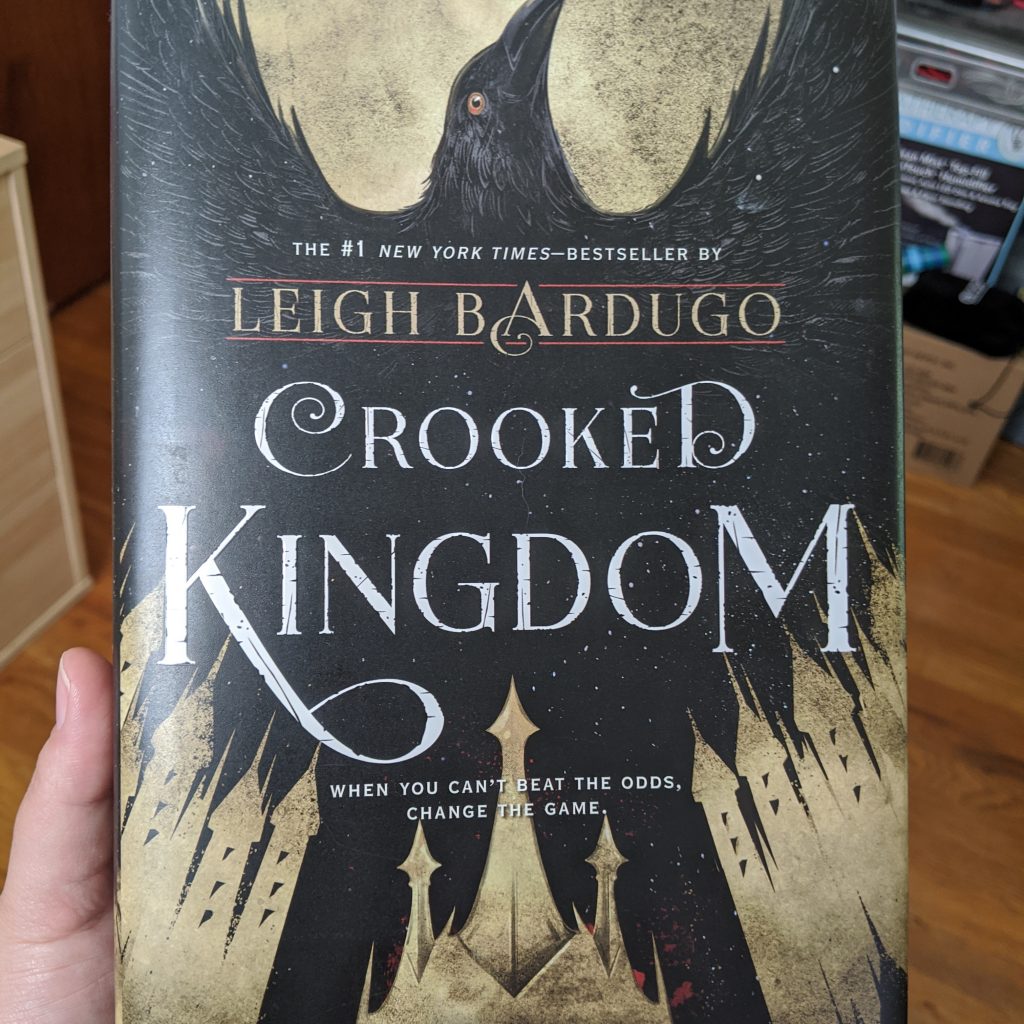
We are back with our same team of misfits, outcasts, and criminals. This time, their goal is to free the lives of indentured Grisha, including someone important from the first book, and take down the rich merchants that have wronged and betrayed them.
Six of Crows had a gorgeously depicted heist where we followed characters through a series of drawbacks to a final goal that correlated to something they all desperately wanted. Crooked Kingdom wasn’t the same type of book. There were still heist-moments and plans that were thwarted, but the end goal wasn’t as clear. What the characters wanted wasn’t as precise, and the way to attain it wasn’t laid out in a full-book-arc plan. Nor could it be, because the characters weren’t aching for a *thing*, but an *idea*. Taking down a merchant’s life work involves so many deceptions and strings to be cut, it involves working from the inside out, instead of a cut-and-dry goal of “break in, get the thing, get out”. In the end, I think this is why the book didn’t feel as strong and seem to have that special something, but that was just the nature of the story Bardugo was telling.
Outside of that, I felt like the description was a bit overwritten, especially in the beginning, even during conversations. And there was a LOT of backstory throughout. I love hearing about characters and some is obviously plot-related and necessary, but there were times I just wanted to get on with it.
Additionally, there were moments when a plan kicked off and just started getting good that we would switch POVs and backtrack to the very beginning of the plan instead of continuing on from that moment, but in a new POVs headspace. That backtrack of having to relive a scene made the story lose momentum and it’s hard to get that back.
One thing I LOVE about Bardugo’s writing in this series, though, is her amazing way with dialogue. She has mastered the ability to have characters in one full conversation, then have a side conversation within it or insert some hilarious witty chit-chat, and then get back on track to the overall point. There was a point when Nina and Matthias were talking about another story within the story and I suddenly was hooked into the plot of her story. It felt like I was walking down the street and my friends were telling me about a book they’d read. It was wild! She has a supreme talent with dialogue, that’s for sure! In the end, Crooked Kingdom was a great read and the end sets up plot threads for Kingdom of Scars, which is really well done. It’s definitely worth a read if liked the first one, but know the plot is laid out differently and it’s not a full-heist, but a book made of small heists in a game of societal deception.
>> Illuminae by Amie Kaufman and Jay Kristoff
First off, what a time to skim the back of a book only to
realize while reading it that it deals with a deadly plague O_O. It’s about a
group of refugees, two lovebirds in specific (well, they broke up before all
this happened, but there’s still pining), that are racing across the universe
to get to a jump point while an enemy warship pursues them – although their
biggest threat may be the fleet’s damaged AI that was supposed to be protecting
them.
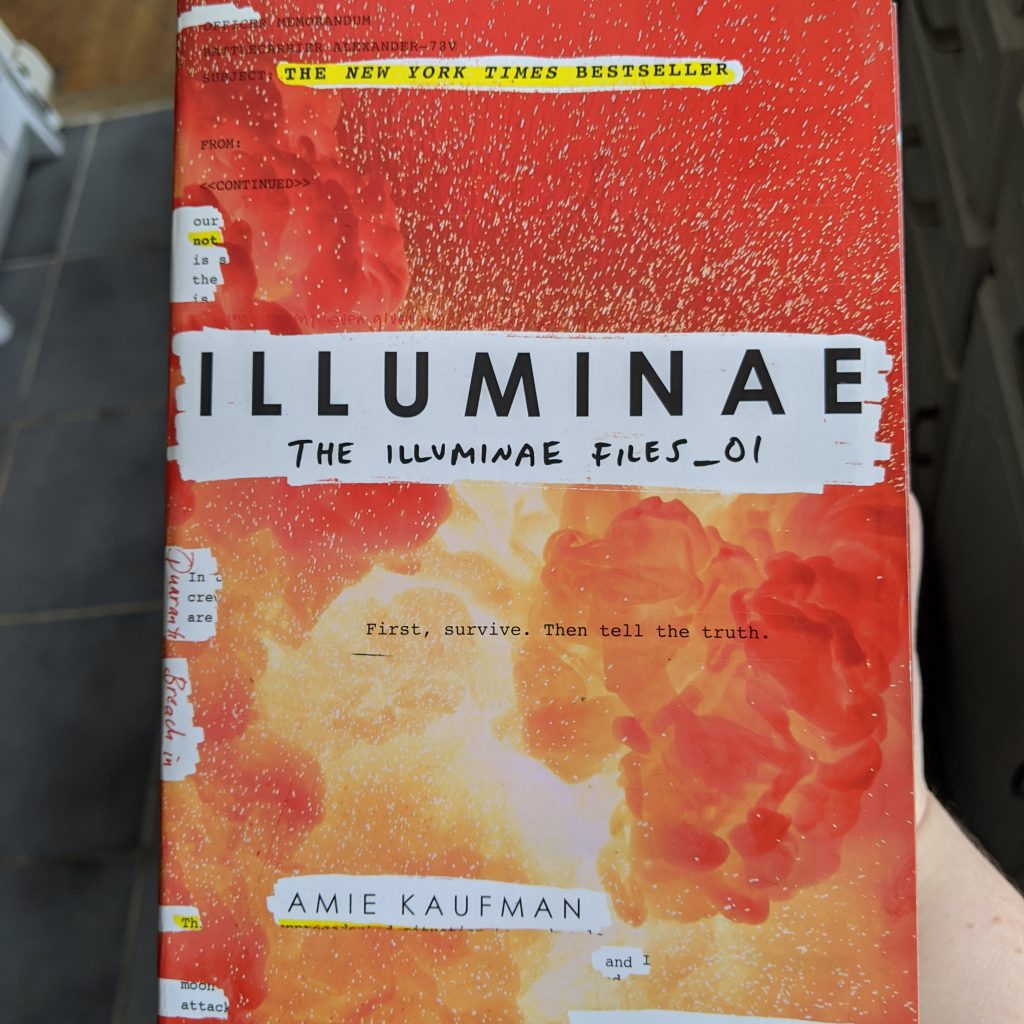
The story is told through a collected dossier of hacked
documents including emails, schematics, IMs, interviews, medical reports, and
journal entries. This, along with some unusual typographic displays from the
AI, makes for a wild ride through unconventional layout and formatting THAT I
LOVED.
I’m a massive fan of House of Leaves (by Mark Z.
Danielewski) who’s book is like a formatting tornado and it’s all done for
REASONS – that’s the best part, that everything he did was for a reason
paralleled in the story and AH this isn’t a review of that, but I knew that I
would love the strange layout before I started this book. And I did. I will
ALWAYS love when an author takes on (and especially succeeds) in taking on a
literary challenge. In this, there’s no narrative that isn’t told through
dialogue of some sort. The tension and description of scenes are written from
the mouth of characters – whether they’re reliving an event during an interview
or a verbal transcription from someone watching surveillance footage. That
means they never fully describe the
room, not really, so every scene has to be specially handled so that the reader
can still SEE the space. And that’s so f*cking cool. There’s another book this
technique reminds me of by Dave Eggers called “Your Fathers, Where Are They?
And the Prophets, Do They Live Forever?” that’s about a hostage situation
written completely through dialogue. And it has to be done carefully enough
that the readers can still see everything. It’s beautiful. I live for this kind
of literary treatment of story, honestly.
SO THEN why did it take me so long to read this? I think…
I think it had a lot to do with it feeling daunting. First off, despite the
pages not being jam-packed with text, the tome is still a 600-page beast. Plus everyone recommends it. People love this
book. So I was wary that I wouldn’t like it. Sometimes I get weirdly put-off of
things when everyone is screaming their love from balconies. I don’t know why
I’m like that. I’m learning to be better.
Anyway, so I crack open this guy and… I hate the first
page. I almost put the book back after reading it. It felt like… a LOT. There
was so much info and you really have to pay attention right off the bat. I actually
ended up skimming it and telling myself after a few more pages if I still hated
it, I’d save it for later. But then I finished the first debriefing of the
evacuation (17 pages that still, in honesty, maybe aren’t perfect with the
weird back-and-forth interview scenario BUT it didn’t matter. The plot had
hooked me.) I went back to the first
page to reread it, powered through the weird one-time-only Wikipedia info dump
and after that, it was go time. I read 100-200 pages a day, easy.
There are a lot of rises in action and tension
where you’re worried for the characters, right up to the end. And the AI, with
its chaos, trickery, and existential breakdowns, was beautifully rendered as a
real character. There are definitely moments in that don’t feel believable for
a dossier, but are left to create tension (like when one character says in an
IM “okay tell me the plan” then it cuts to the surveillance footage of the plan
unfolding – a real dossier would have included the messages talking it
through.) But I’m giving them creative freedom on teeny points like this
because come on, it was great!
>> One of Us Is Lying by Karen M. McManus
I read this book in four days, it was crazy. I couldn’t put it down. It’s multi-POV, present tense (which I’d gotten used to thanks to The Night Circus), written linearly with no time overlaps. And IT FLOWED SO BEAUTIFULLY. One POV right into the next. The Voice is what really hooked me, I think.
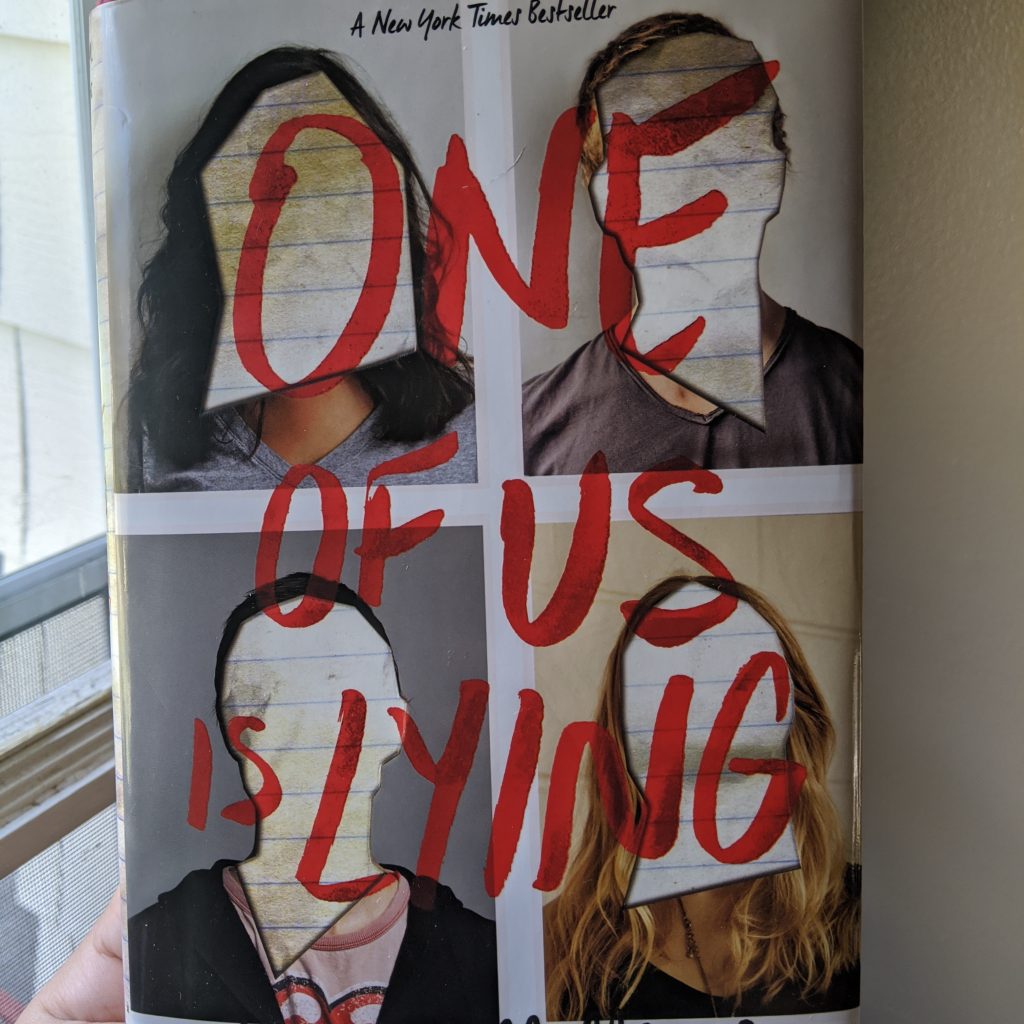
I was off-put by the stereotyping vibe you get from the flap copy, but they make fun of it in the first chapter and then suddenly it’s not a big deal anymore. Expert decision, right there. Then the characters start to feel better-rounded and their stereotypes begin to just feel like personality types. It’s never in your face. Although there are still a lot of clichés, so I guess be warned about that.
There were a few things that bugged me… let’s see, how do I do this without a spoiler? Firstly, we go into this book knowing that a) the stereotyping is right there on the book flap and b) it deals with “juicy gossip” about high-profile classmates. So, there should be no surprise when certain key personality traits about the characters are weaponized for the gossip. Some of it, I think, can be triggering the way that the traits are used as plot devices and/or villainized. I think it’s something to be wary of going into this, but McManus never tries to hide that she’s having a cut-and-dry trope-tastic time. I won’t go further into this because of spoilers, but there are things that teens keep secret for a reason and this book is all about a character trying to dislodge those secrets. Even that character themselves (the one doing the dislodging) has a personality trait that is weaponized and not handled too gently.
The only other thing that bugged me the whole time is that this book was set in San Diego – my HOME TOWN (which means I knew all the places she referenced, and even guessed at places she slightly changed the names for) – but the high school was an INDOOR SCHOOL. All our high schools down there were outdoors. Buildings popped up from asphalt and grass like stocky square petunias. You walked from one class to the next in the blazing sun or pouring rain – kids huddled under overhangs or braved the elements. I know McManus mentions that it’s supposed to be farther east and maybe out by the desert there are schools that are indoors (there’s one up north called Westview that I’d wager this is modeled after because their school is called Bayview, which I think is indoors), but if these kids are familiar enough to drive around downtown, go to Petco stadium, or up the 15 to Joshua tree, then they’re close enough to the main city to have an outdoor school. IMO.
I’m probably just making things up, she probably did her research, everything’s probably fine.
/rant
As far as the mystery itself goes, McManus throws a lot of red herrings around that had me second-guessing my original theory, but I’m happy to report that at the end (and what a lovely roller coaster adventure to get there) I was thoroughly vindicated. And let me tell you, nothing feels better than going I KNEW IT at the end of a mystery. Solid YA mystery. I’d recommend this to someone who maybe doesn’t read a ton of mysteries and wants to get into them, as well as anyone who loves young adult books because the voice is pretty solid.
>> The Night Circus by Erin Morgenstern
Lovely, lyrical, and magical. A beautifully rendered literary fantasy, something I would highly suggest to readers who enjoy more literary works and are looking for an introduction to fantasy.
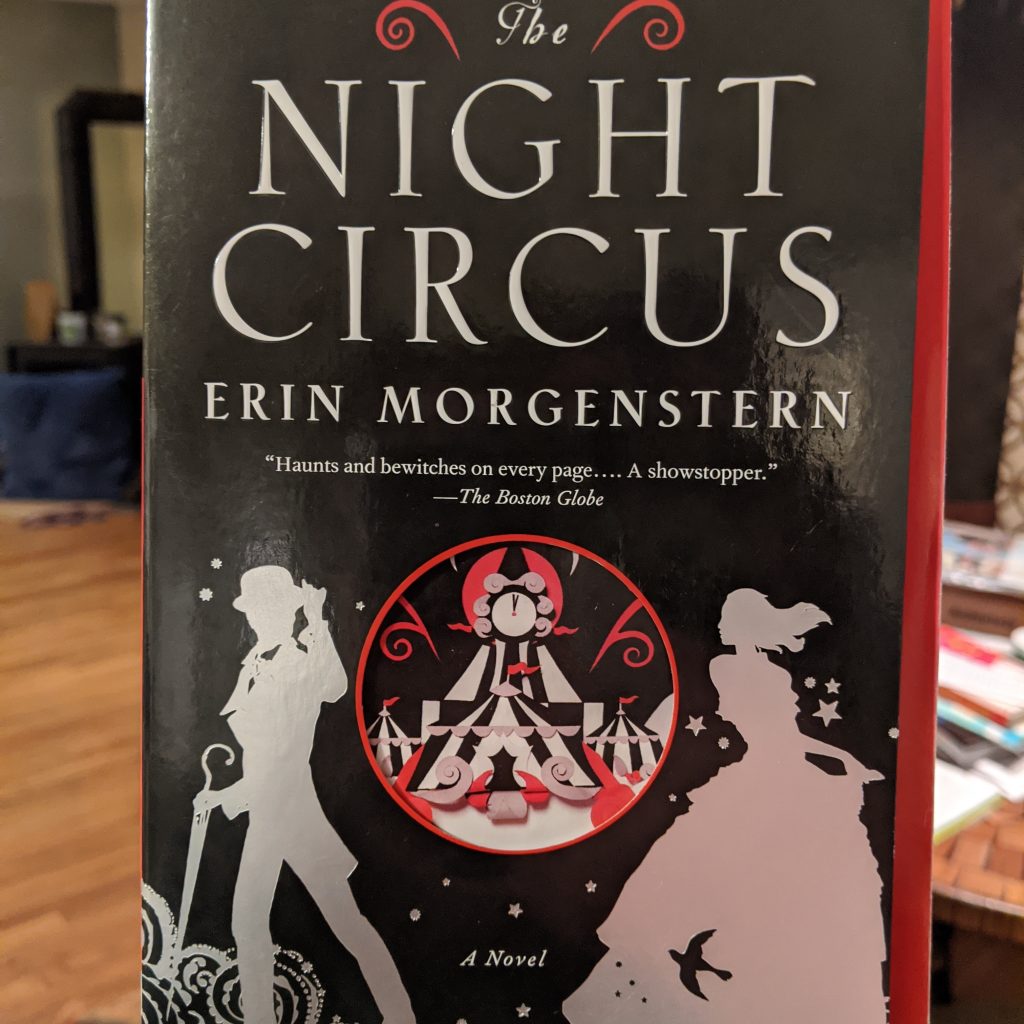
I realized early on that this is a book to be patient with. Not only is it written in omniscient multi-POV, but it’s also in present tense. There’s a lot stylistically that takes getting used to. Additionally, it’s an epic that spans quite a large amount of time – about 30 years for the main characters and even branches out further with mention of the mentor’s ages and histories. It wasn’t going to be a book that built a lot of tension and momentum. It was something that needed appreciation for what was on the page at the time. In the end, they speak briefly on the concept of time, which I won’t write extensively about here, but looking back I find the need to appreciate each page and scene as rather poetic in connection to it.
I most enjoyed the two competitors slow tumble into love, as the magic they use in competition began to feel like love letters to each other. I was captivated knowing that only one would be left standing, wondering how it would turn out in the end, while also feeling mesmerized by the different magical tents in the circus and wondering what I would find around the next corner.
I’ve seen other reviewers say that the book isn’t about the romance, that it’s about a thing – the circus itself. But I didn’t feel like that was wholly true either. I felt it was more about the competition, what it means to have consequences to actions on a chess board of real people and what it means to fall in love with a competitor. I’m rapt with the metaphor of the black and white circus, a stark his and hers, yes and no, like a black and white chess board, but all the while run by a man in grey. The idea that even from the beginning, there was always a mixed point. There was always an addition of grey when it needed to be there. When him and her become they. When the rules change and the lines meet and bleed together. When the world isn’t perfectly one or the other. In the end, I don’t feel like I read this book. I feel like it lived inside me and I was finally reminded that it was there the whole time.
>> House of Salt and Sorrows
I had heard nothing but amazing things about this book and it didn’t disappoint.
What it’s about: The
story is a retelling of The Twelve Dancing Princesses fairytale. It’s about a
girl named Annaleigh who lives in a manor with her sisters, father, and
stepmother. But four of their older sisters have died. Annaleigh is disturbed
by ghostly visions and feels that the deaths were no accidents. Her sisters
have been sneaking out every night to attend glittering balls, but who—or what—are
they really dancing with? It’s a race to find out who is behind the deaths
before it claims their next life.
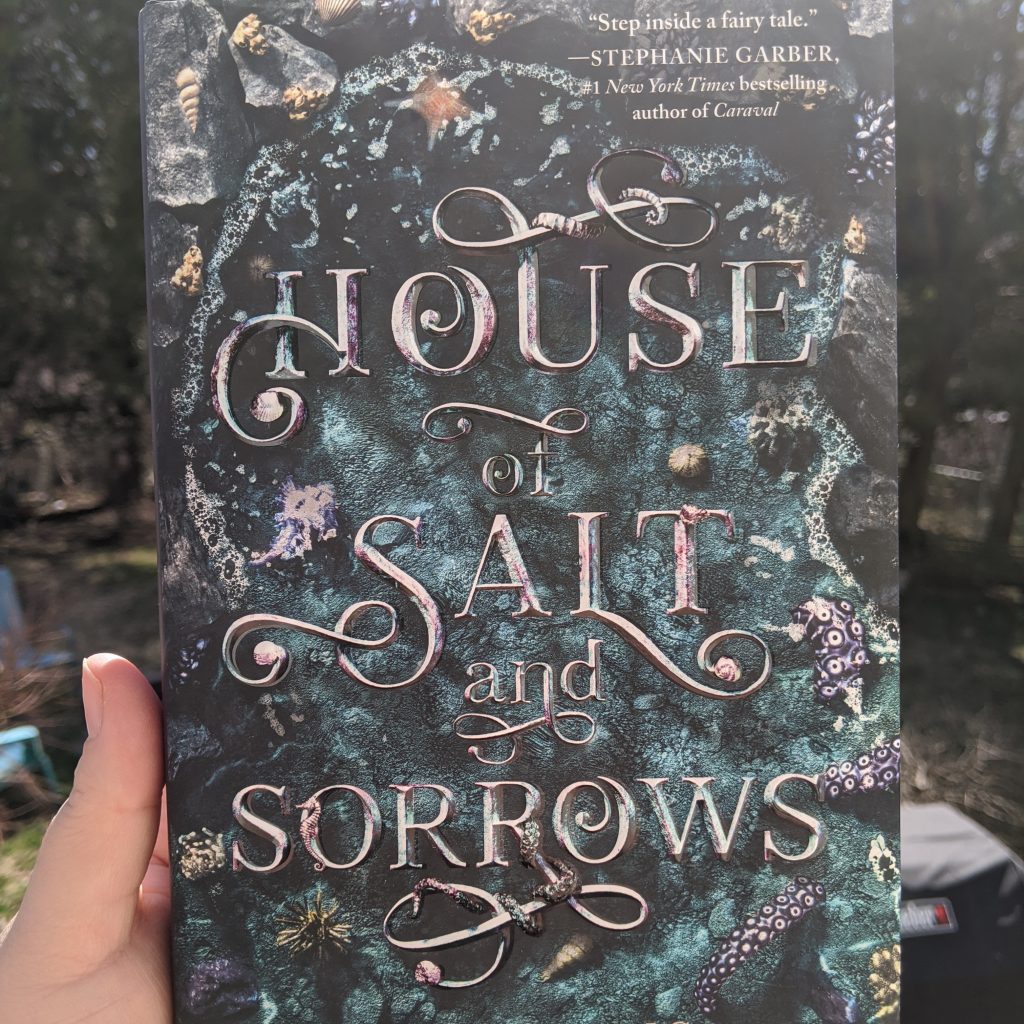
Firstly, the flap copy and blurbs made it sound far scarier
than it was. It certainly had creepy, ghostly, and gruesome moments (which were
all beautifully rendered!), but the book wasn’t a constant onslaught of murder
and ghosts.
The first half of the book was spent mostly
focused on the daughters going out dancing at balls around the kingdom. I
honestly wasn’t fully prepared for how much time and description would be spent
on sparkly dress fabrics, hair, and makeup. I spent most of that time clutching
to the book’s first and ever-present question of “who killed the sister, and
were the other three sisters murdered as well?” Craig deftly lays out clues for
the reader to follow during the first half that kept me reading (mostly to see
if I was right!). Up until the middle, honestly, I felt the book was just
decent (well-written, clues laid out, etc) perhaps meant for people who like
reading about pretty dresses and such, but at the halfway point everything took
a turn into hard magic and just cascaded into brilliance. I couldn’t stop
reading. All the clues slammed into place and she painted up some good twists
so it didn’t play out quite like I anticipated. There were moments where I had
to suspend my disbelief (and I can’t say where without feeling like it’s
spoilery), and there were a couple times that a detail felt missed in editing
or the character was making a weird decision, but those moments aren’t going to
break this novel. It’s definitely worth a read, and I expect to become one of
those people recommending to others. Haha.
>> Winterwood by Shea Ernshaw
This was a beautiful, atmospheric book about a girl who discovers that one boy has gone missing from the local camp and another boy is dead. Every page is laced with creepy woodsy vibes and old magic. The main character, Nora, is the end of a long line of witches who hasn’t discovered (and fears she may not have) her “nightshade”, or the thing that makes her special and magical. I think the witch vibes were handled in a unique way, in the sense that it wasn’t a hard magic system, but an ancient, natural bloodline magic that didn’t stand out over the plot. In fact, Ernshaw did a good job making sure the reader knew the woods had the biggest presence over everything. You couldn’t escape it, the weight of it was always there on every page. By the end you truly begin to understand how Nora feels like she is part of the woods, even though it’s been there from the beginning.
One thing, just literarily speaking, the magical elements can easily be relegated to a youthful imagination which I think is something that made the book feel even more powerful. That question of whether or not you can truly trust the narrator, even after the book is over, sticks with you.
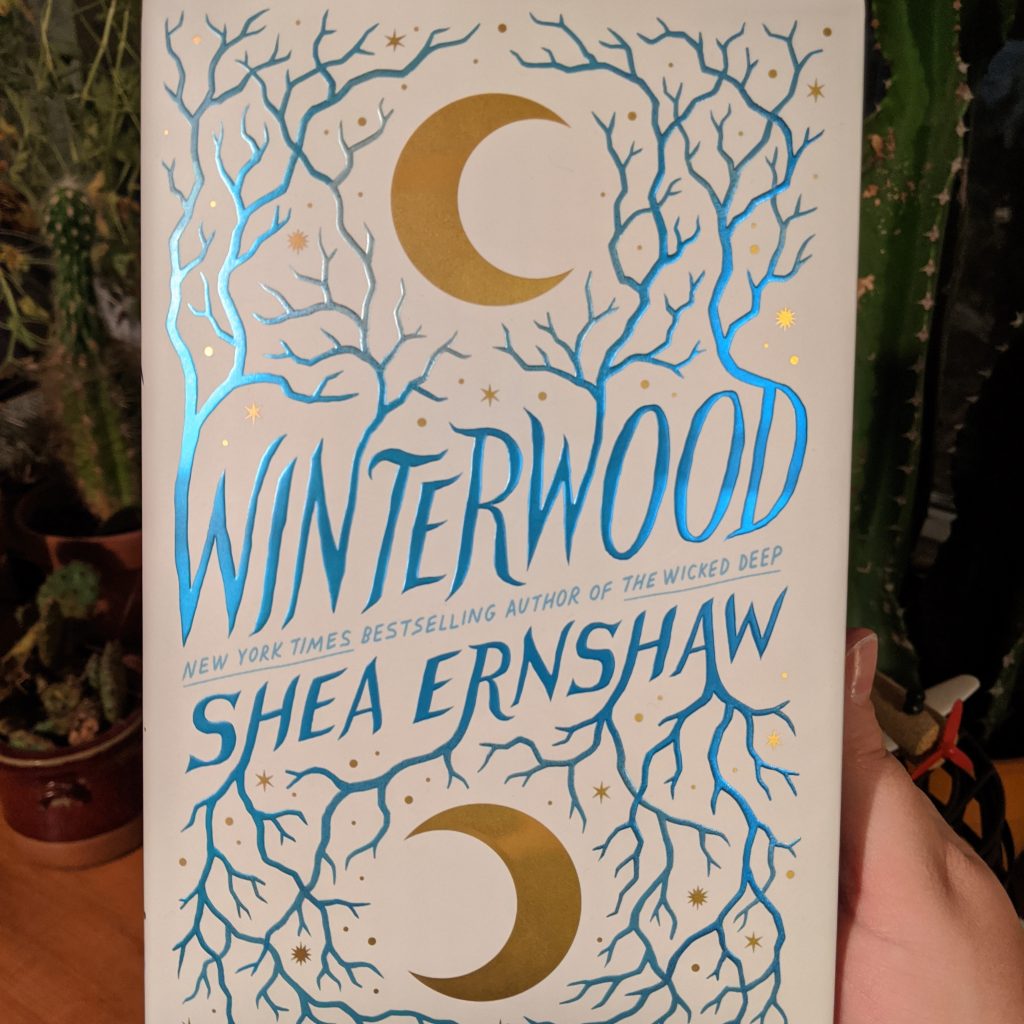
>> Starflight by Melissa Landers
This book is about an orphan mechanic with felony tattoos
who is looking for a new life, indentures herself to a rich quarterback, and
they both wind up on some cruddy ship with a family of outlaws chasing down
some mysterious coordinates deep in space.
It was a dual point of view between the mechanic, a girl
named Solara, and the quarterback, Doran. And it was a surprisingly short book
considering it was SciFi.
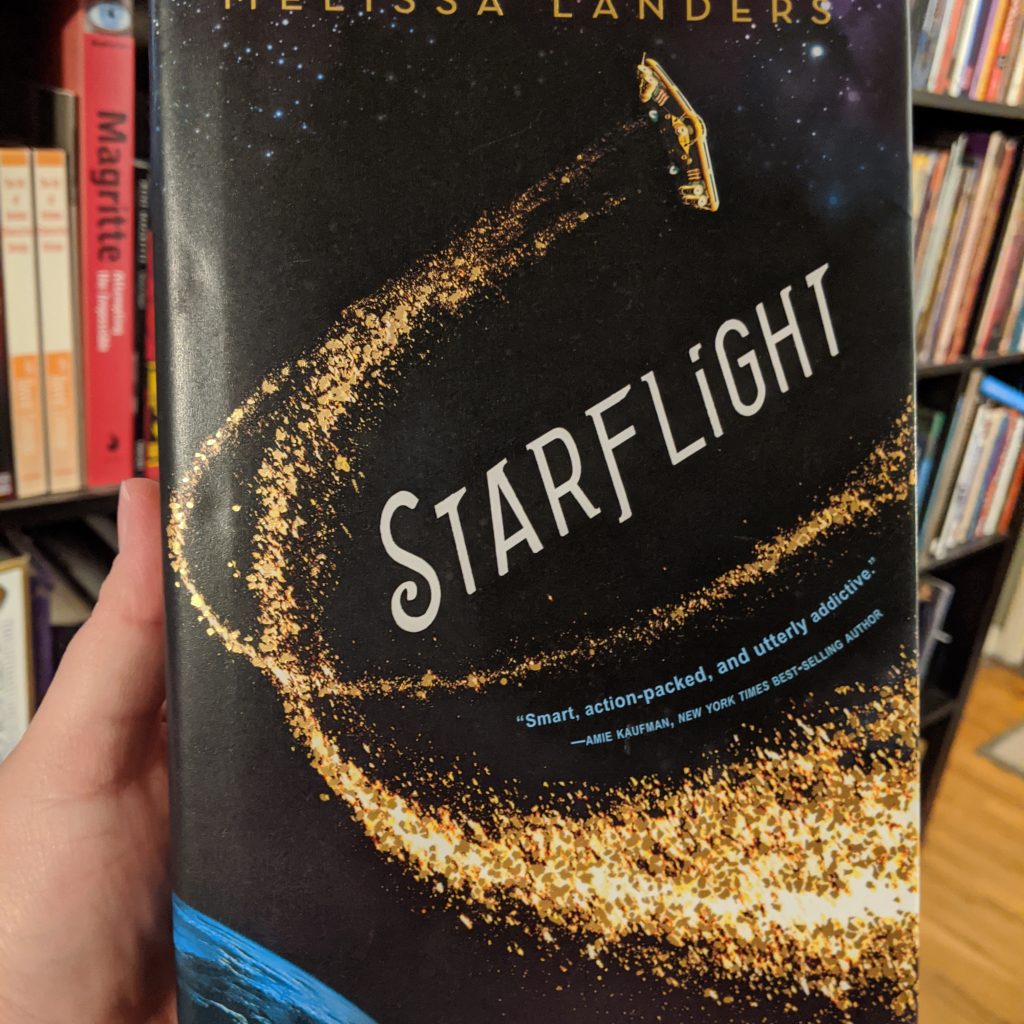
What I liked? There were certain plot elements I really
enjoyed, particularly the pirates – I mean, pirates in space are going to win
every time, honestly – and the concepts behind the temporal-lobe-limited Daeva
bounty hunters. Actually, I liked how there were three different groups chasing
the crew for various reasons (and through the plot they only added groups
chasing after them). It added tension and interest and even some comedy.
But there were five things I had trouble with.
- Solara is a dick. Sure, Doran is a privileged ass, bullied her throughout her life, and tries to abandon her on some refueling station. I get it. But when Solara has the opportunity to stun him and he loses all memory of who he is, she takes advantage of his memory loss and begins BEING AN ASS TO HIM. It’s this smug revenge that made me dislike her from the very beginning. How you treat people in vulnerable situations says a lot more about YOU, than it does about them. (Maybe some people like this flip, but his bullying wasn’t fully developed enough in the backstory for me to route for this). So I’m following a story about a privileged bully and a cruel girl, and not cruel in a good way, which means I started the book disliking BOTH characters with ne’er a “save the cat” moment in sight.
- Amnesia. I’m beginning to think I don’t like the amnesia trope. It needs to be handled gently, or at least differently. It’s too convenient a plot device. This is personal, obviously. But because it *is* a trope, the opening of this book felt like a fanfiction… That “two characters that hate each other, one gets amnesia, they fall in love, they have passionate space sex, amnesia-boy remembers who she really is and gets upset, but they have to work together to get out of whatever plot issue they landed in” thing. I won’t tell you if I was right or wrong, because spoilers, but… yeah.
- Bully Redemption Romance. We’re constantly getting dragged away from the plot to return to the romance between the main characters as they realize they like each other, but don’t want to. It has that “space-jock bullied her but now he’s redeeming himself” trope and it’s… frustrating. I noticed that the author has a background in romance writing which is probably where that stems from, but the rich jock picking on the poor girl, him feeling bad, and them falling in love is a trope I don’t often appreciate.
- Lack in Worldbuilding. I could have guessed this when I saw how short the book was compared to the ambitious plot. Some people might see this as a good thing, a very attainable SciFi for any reader without all that techy verbage and heavy setting detail getting in the way (a common reason people don’t always love this genre). But I felt like it went too far in that direction. It lacks in creative names for spacey items and there’s almost never information on the setting. It’s really basic, there’s earth and moons, and rings built out across the galaxy. She’s in a bunk or an engine room or on a planet with a sun. It’s not *necessary* exactly, but it felt lacking to me, like I wanted a little bit more. There’s no mention of near or distant future or how long it took them to get where they are either. Often they’ll throw in common things – like a mention of Texas – and it would totally throw me when they’re deep in space travel.
- Oh, the Telling. I was about a quarter of the way in when I realized this and now I can’t unsee it. The book is riddled with stock gestures and Telling not Showing. My favorite stock gesture was “she turned her neck to face him”. It’s SO unnecessarily wordy. Often, too, Landers will begin doing a decent job Showing the reader what’s happening, then blantantly Tell them what they should be seeing. She’ll describe all the items in a room so it’s obvious what the room is (like there’s a fridge, an oven, etc) then say “it didn’t take long to figure out this room was a kitchen.” I get it. I knew it was a kitchen. You described it. I was there. It just felt like a punch, like she either didn’t trust the reader to understand her description, or she didn’t trust herself conveying it. (The kitchen was an example I made up, but she did it with other spaces).
>> Saga: Book One written by Brian K. Vaughan, illustrated by Fiona Staples
It’s nice to step away from novels sometimes, to be able to take in a story in a medium you don’t often partake in, and Saga captured me.
It follows the star-crossed parents of a newborn (the latter
of which is the narrator) and their adventures while running from bounty
hunters and beasts through the galaxy.
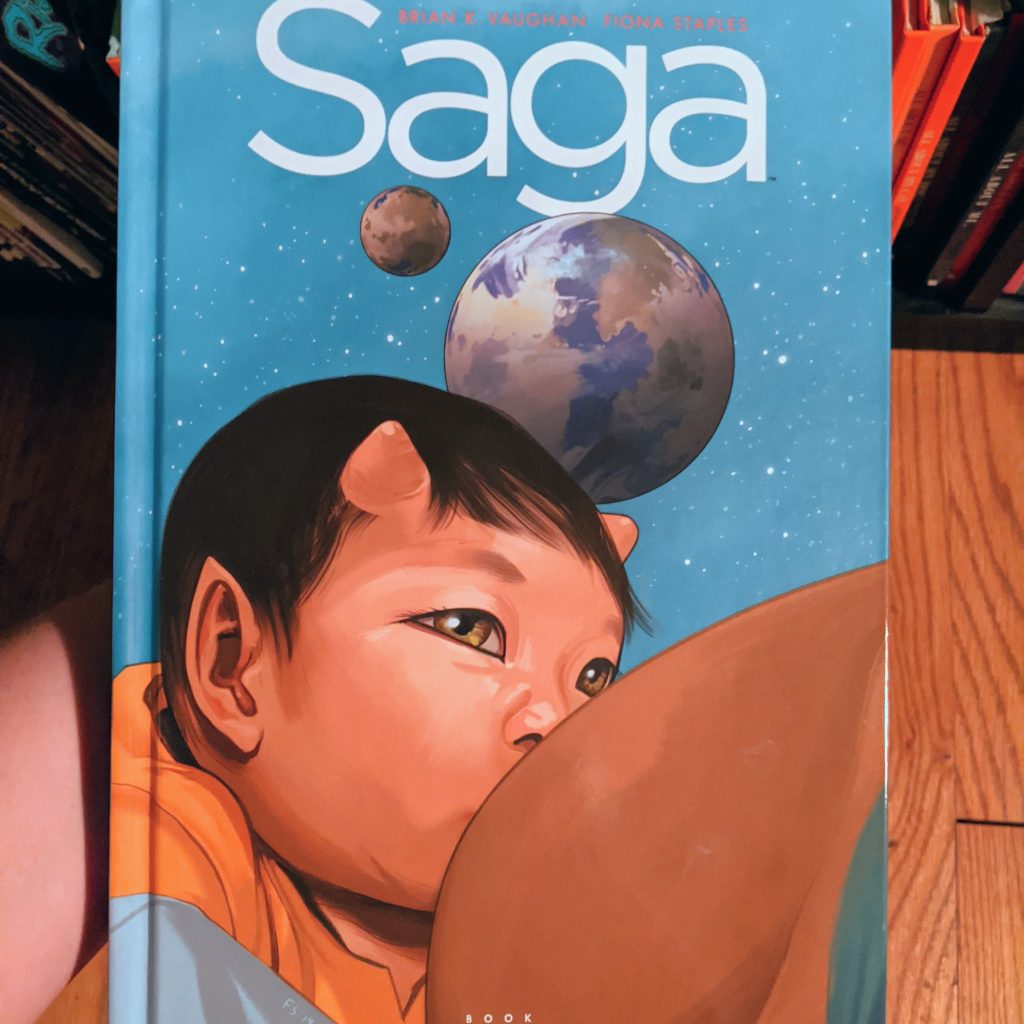
I think the thing I felt most attracted to about this story
is the certain unique hooks the author uses to draw the reader into the next
chapter like strangely shaped aliens or giant gorilla illusions. I did a review
on Volume One (before continuing the saga) where I note home much I love the
interesting characters like the half-bodied ghost babysitter and the giant cat
that can detect (and will announce) when you’re lying. Following my favorite
characters hasn’t let me down, I love how Vaughan uses them and their abilities
in different ways.
There is one thing I’m not sure I love about the story yet.
It’s that our main family has nothing but a negative goal – they’re running
away from things instead of toward something they want. Near the end of Book
One they begin talking about what could be next, but I’m wary that the story is
going to be predominantly a negative goal, which I fear won’t hold my attention
for an entire saga.
I’ll give it some time to see if I’m still entranced (or
maybe I just miss Liar Cat enough) to be drawn back into the world for Book
Two.
>> A Darker Shade of Magic by V.E. Schwab
I love VE Schwab’s prose. It’s lyrical, specific, and paints vibrant yet tightly spotlighted scenes. I randomly picked up this book while reading another, devoured the first chapter, and then sort of stumbled into the realization that I was properly reading the book. In the most hipsterish sentence I’ve written about myself, I bought this book from B&N’s new-releases shelf ages ago because I liked the cover, you know, before liking V.E. Schwab was cool. Of course it took me until now to read it, completely invalidating whatever hipster vibes I thought I had.
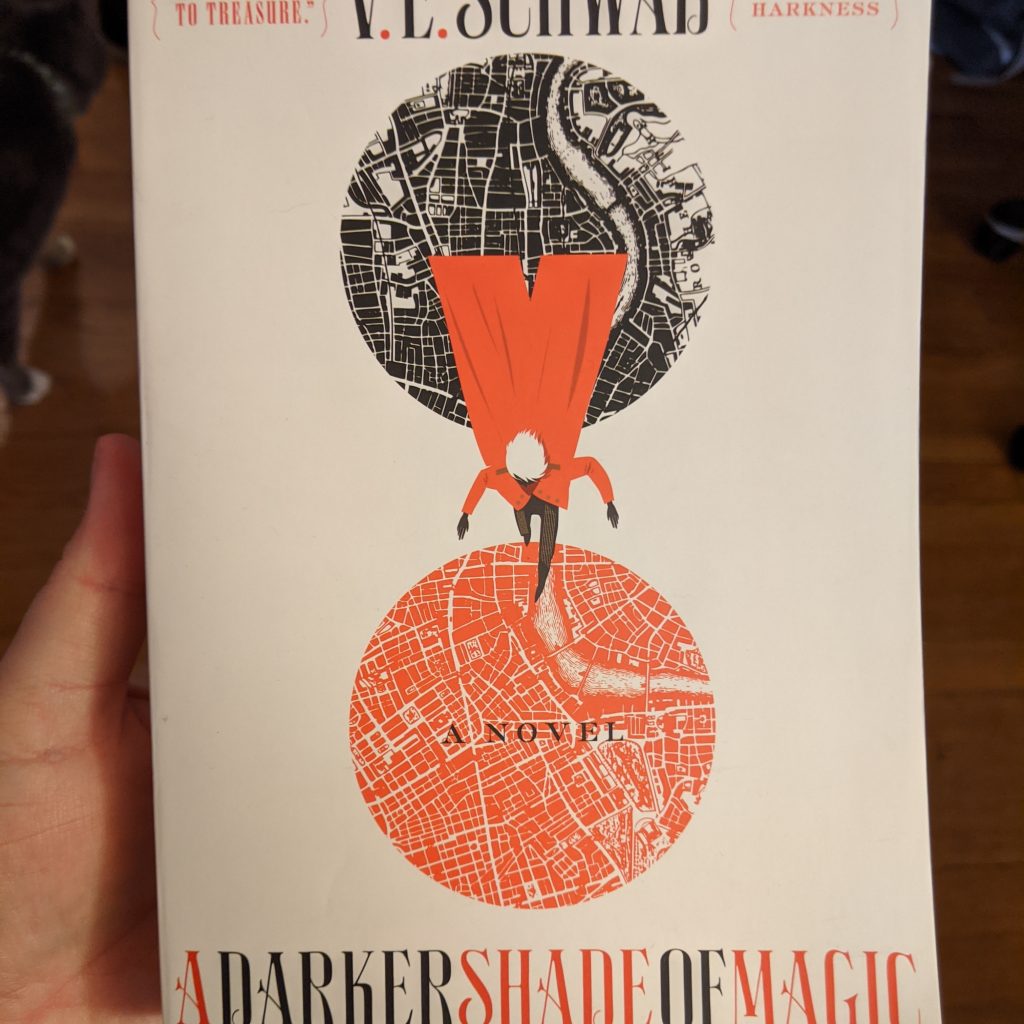
The story follows Kell who is one of the few
magically-capable lads able to cross into the alternate Londons in different
universes. He’s developed a rather bad habit of illegally trading items from
the different Londons and stowing his gained treasures in a little hovel above
a bar, not unlike a squirrel with a complicated black market nut issue. Welp,
no surprise, Kell ends up with a bad nut. A black stone packed full of raw
magic has landed in his possession and he’s been tasked to return it to its
owner in a different London. But it’s a trick, and the people who want to use
this raw-magic-rock are using poor Kell as a proper drug mule. Oh, and maybe
worse yet, every time Kell uses the stone’s magic it digs roots deeper into his
veins. It’s up to him and a plucky, adventurous girl named Lila (easily my
favorite character) to keep it out of the bad guy’s hands and return it to the
dark, dangerous London in which it belongs.
This is going to sound a bit crass, and I apologize ahead of time, but Schwab’s books often feel, to me, like edging. You know, when you get closer to getting your ticket stamped at the end of your personal bedtime routine, but you haven’t yet and you’re ALMOST there. Her writing always feeds you juicy information, getting you closer, then pulls back into the narrative. When the climax (of her books, you dirty bird) finally comes, it’s never as over the top as I expect it to be AND YET I’m always left wanting more of her stories, characters, and writing. I want to be fully entrenched in her worlds, knowing every detail and bit of magic ability, but I feel like I’m only wading through them – which keeps me coming back for more details.
Sometimes when I feel like a book has been reviewed a thousand times and mine is a drop in the hat, I’ll write a more amusing review instead of a serious one. This is one of those times. Am I sorry that I compared a gorgeously rendered character like Kell to a squirrel? No, no I am not. Do I recommend said book for your reading ventures? Yes, yes I do. It was lovely.
>> Aurora Rising by Amie Kaufman and Jar Kristoff
This story is about a captain who saved a girl trapped in a cryo sleep pod in the dead of space which caused him to miss a crew-choosing ceremony and landed him with the dregs of students not chosen for specific reasons – all of which leaned into themes of acceptance and trust. The girl, Aurora, has special rather explosive powers that cause them to quickly become on the run from law enforcement and tasked to save her from enforcers that would prefer her destroyed. The book was packed full of action, interesting story points, and an interesting cast of characters. If that’s your jam, then this book is for you. I only had one… rather large issue…
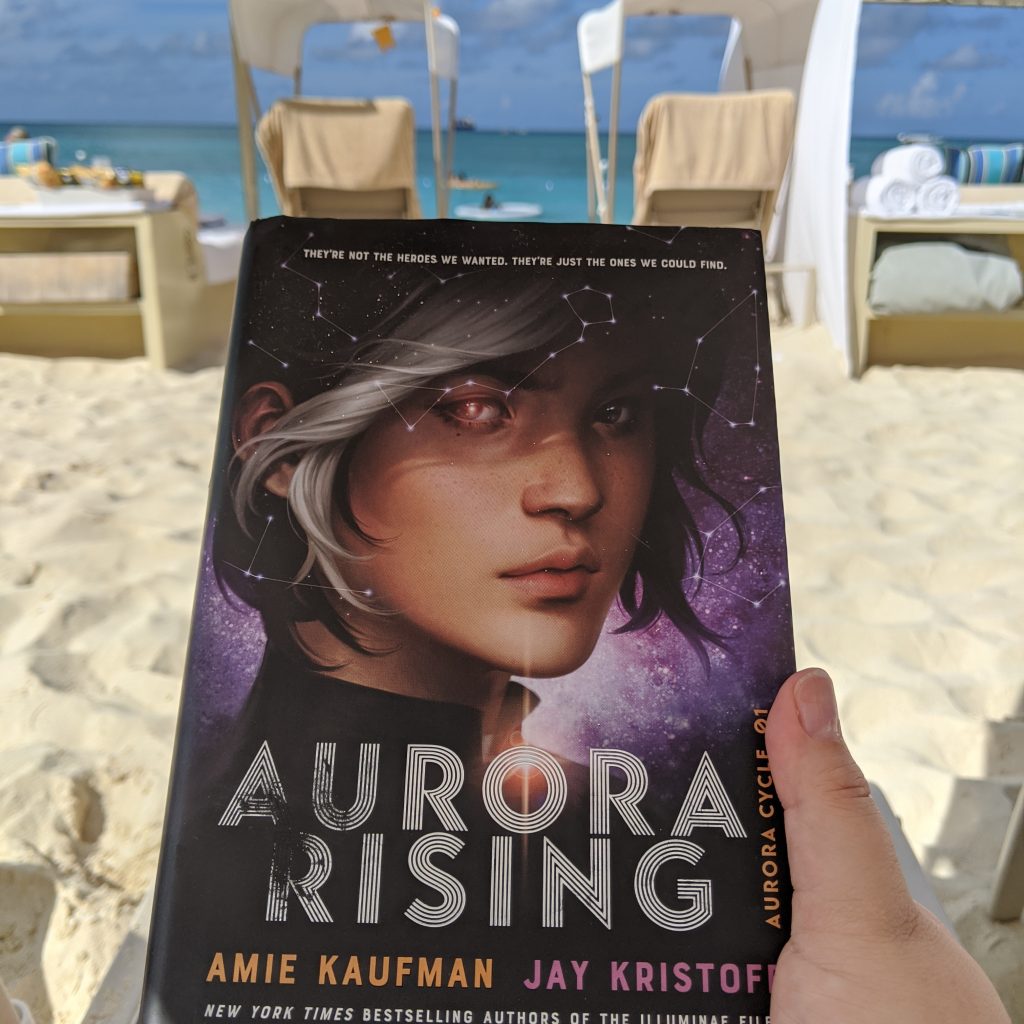
The biggest issue I had was the use of multi-POV. *Every*
character had a POV. All seven of them.
And it. Was. A. Lot.
I could never quite pinpoint why we needed to be in a
certain character’s head at a certain time. It often felt like “here’s a new
scene, guess we should head-swivel to someone else now”. And some characters
that I thought would end up having big roles (because they should all have big
roles if they have their own POV, right?) just… didn’t. It would flitter out
with a relatively satisfactory character arc, but didn’t feel worthy of their
own POV. Even the main character, noted as main because he received the first
chapter’s POV, didn’t have as strong a role as he should have. Everyone was
battling for stardom and I ended up just wanting the book from a few
perspectives. This was one of the first books that I actually found myself
wanting to skip over certain POVs (but you can’t because each moves the plot
forward, and, honestly, I found that really annoying).
Additionally, the issue of Aurora’s lost family was big
throughout the book and the reveal at the end wasn’t what I was hoping for. I
think this is generally quite personal and other people might really love this
ending, but I was definitely hoping for a different result.
